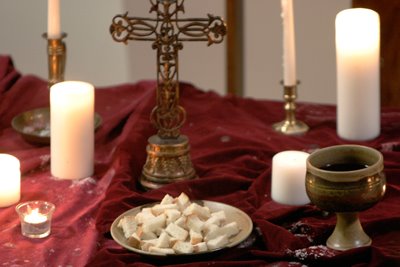 Suppose, for a moment, that a Christian wholeheartedly believes that the successful and blessed Christian life must include a particular type of music, these types of friends, this genre of books, this outreach of ministry, this type of clothing . . . the list goes on and on. Additionally, suppose that, in this person's eyes, a right relationship with God requires the adherence to these beliefs, and any person not in compliance with this particular set of standards is on the slippery slope to perdition--or, at the very least, isn't able to hear from God at the same acute level. Now, multiply this scenario by the amount of denominations, sects, and creeds that hold to the Bible as their sacred text and to God as their Father, and we begin to get an idea of the current state of the universal Church.
Suppose, for a moment, that a Christian wholeheartedly believes that the successful and blessed Christian life must include a particular type of music, these types of friends, this genre of books, this outreach of ministry, this type of clothing . . . the list goes on and on. Additionally, suppose that, in this person's eyes, a right relationship with God requires the adherence to these beliefs, and any person not in compliance with this particular set of standards is on the slippery slope to perdition--or, at the very least, isn't able to hear from God at the same acute level. Now, multiply this scenario by the amount of denominations, sects, and creeds that hold to the Bible as their sacred text and to God as their Father, and we begin to get an idea of the current state of the universal Church. To assume that one set of convictions is "the most excellent way" which incurs the most favor from God also communicates that God only blesses and works through that same set of circumstances. So many denominations and individuals decry themselves as the best, implying that God is incapable of working His redemption and salvation in the church across the street or around the corner to the same extent. Families judgmentally look down on those with looser--or stricter--convictions, focusing more on rote than relationship, and more on God's hand than His face.
This perspective has incurred a terrible toll on the church today. To condemn fellow believers because they believe differently than we do, even when the beliefs of both parties are based on Scripture, does more than harm the body of Christ and alienate believer and nonbeliever alike. It limits God by seeking to define Him and confine Him to boundaries which are too narrow. It implies that God is not capable of working personally, both physically and spiritually, in the hearts and lives of others in different places. It reduces the King of the universe down to a formula to be followed. Above and beyond the ramifications that this belief has on the unity of the Church, this sad fact is the greatest tragedy of all.
The early church had the same problem: "Now, I beseech you, brethren, by the name of our Lord Jesus Christ, that ye all speak the same thing, and that there be no divisions among you: but that ye be perfectly joined together in the same mind and in the same judgment . . . Now this I say, that every one of you saith, I am of Paul; and I am of Apollos; and I am of Cephas; and I am of Christ. Is Christ divided?" (1 Corinthians 1:10-13).
Does the modern-day Bride of Christ endeavor to keep the unity of the Spirit in the bond of peace? Are we one, even as Christ and His Father are one? More often, I hear, "I am of John Wesley," "I am of Martin Luther," "I am of the Baptists," "I am of the Presbyterians," "I am of Billy Graham," "I am of John Piper" . . . and the fighting goes on.
"There is one body, and one Spirit, even as ye are called in one hope of your calling; one Lord, one faith, one baptism, one God and Father of all, who is above all, and through all, and in you all" (Ephesians 4:4-6).
Biblically, little debate can go on if it falls into one of the seven categories above. God has established clear direction for these tenets. This writing, however, is a call to unity in the body of Christ, in the categories that Paul wrote above, and in interactions with other believers as well. Let us major on the majors, and minor on the minors. And let us say together, "I am of Christ."



